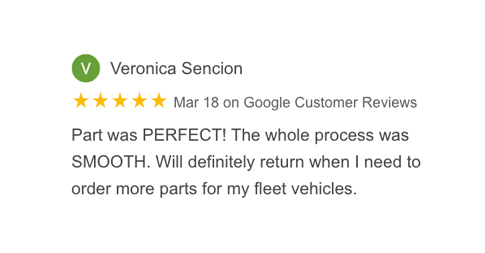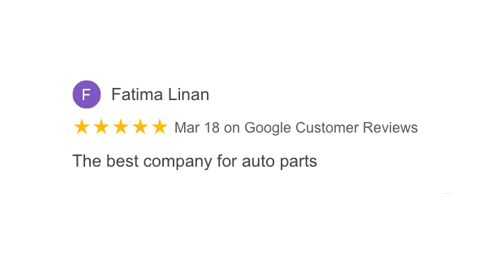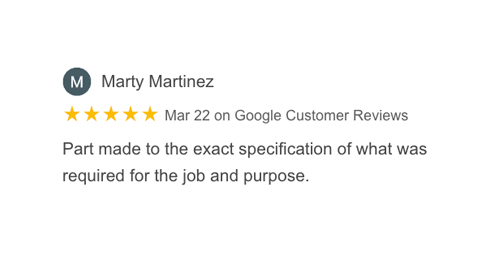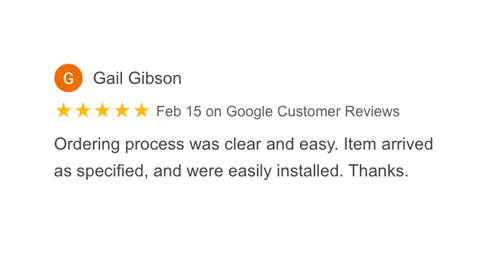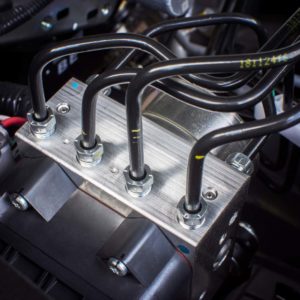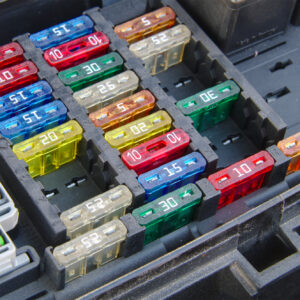Your vehicle’s anti-lock brake system (ABS) prevents the wheels from locking up in emergencies and restores traction to the tires. It’s an important safety feature that you shouldn’t overlook. The ABS module monitors the system’s various parts to ensure that it’s functioning properly. The question is, what options do you have if your vehicle’s ABS module is inoperative?
What Is an ABS Module?
An ABS module, also known as an ABS control unit or ABS controller, serves as the ABS system’s central computer. It receives information from the wheel speed sensors, runs diagnostic tests on the hydraulic modulator valves, and controls those valves accordingly. Upon detecting a possible wheel lockup occurring, the ABS module controls the hydraulic valve assembly to prevent the wheels from locking up.
Some people refer to EBCMs as ABS control modules, but not all ABS control modules are EBCMs. EBCMs control the electronic braking system. In addition to the anti-lock braking system, EBCMs also operate the primary brakes and related systems such as traction control.
When To Replace or Repair Your ABS Module
Replacing or repairing your vehicle’s ABS module is no small expense. It can be pricey, which is why it’s important to be sure your ABS module is damaged or inoperative before committing to replacing or repairing it.
The biggest indicator that something is amiss is an illuminated ABS light on your vehicle’s dash. Once you rule out issues with your vehicle’s brake system, try turning the ignition key off and on again to reboot the system. If the light goes away, there likely wasn’t anything wrong with the ABS module. If the light stays on, take your vehicle to a repair shop so they can use an ABS code reader to diagnose the problem.
You can also try accessing the diagnostic trouble codes without an ABS code reader, but this process can be much more difficult. Some vehicles will cause their ABS light to blink on and off in a specific pattern that points to the correct trouble code. This will require you to pull one of the ABS module’s connectors and bridge two of its pins with a wire or a piece of metal. You’d then need to decode the blinks using a shop manual. It’s a complicated process overall.
It should be easier to identify what’s causing the trouble with your ABS system. Once you know the illuminated light isn’t caused by the system’s fuses, wires, or speed sensors, it’s time to look at replacing or repairing your vehicle’s ABS module.
Should You Buy a Used ABS Control Module?
Replacement ABS control modules are expensive because their inner hydraulics and electronics are difficult for the average DIYer to service. Many people consider buying a used ABS control module instead. Secondhand ABS control module sellers pull the modules from older scrapyard vehicles and refurbish them for new users. But are these used parts worth what you’re paying?
Benefits
The main benefit of used ABS modules is that they’re much cheaper than new modules. Also, if the module is from a reputable source, it provides similar output to a brand-new one. It also helps the environment by reducing the waste in junkyards and keeping materials out of the landfill. Using an OEM component, even if it’s secondhand, also helps increase your vehicle’s lifespan thanks to its custom fit.
Drawbacks
There are also a few drawbacks to buying a secondhand ABS control module. You need to do ample research before buying a module. First, it must fit your vehicle, and finding the perfect fit can be difficult depending on how common your vehicle is. Reputable used ABS module sellers can check their stock for you if you give them your vehicle’s year, make, and model. Take care to avoid scammers.
Next, you’ll need to have the shop reset the ABS module’s VIN. A used ABS module does need to be programmed. Because it’s secondhand, a used ABS module carries the VIN of its original vehicle. You, the seller, or a reputable automotive shop will need to clear the VIN from the used ABS module before plugging it into your vehicle’s ABS system. Failing to do this will cause issues down the line.
What Is a Rebuilt ABS Module?
If you take your vehicle’s ABS module to an auto repair shop, they might have a rebuilding service available. They’ll take your vehicle’s ABS module, repair it, and return it to you.
Benefits
Like secondhand ABS modules, rebuilt ABS modules are much cheaper than brand new ones. Because it’s your vehicle’s original ABS module, you also don’t need to worry about resetting and encoding the module’s VIN.
Drawbacks
Unfortunately, if the shop can’t fix your vehicle’s ABS module, this option isn’t available. If you had to ship the ABS module to the shop, those shipping fees would be non-refundable as well. In addition, you’ll probably have to pay for the shop’s diagnostic fee. If you end up buying a whole new ABS module in the end, paying the diagnostic fee can feel like a waste.
Choosing Between New, Used, or Rebuilt ABS Modules
While used and rebuilt ABS modules are both good options, it’s also good to consider buying a brand new ABS module instead. While it’ll be much pricier than the other options, it’s also the safest and most thorough one. It’ll resolve all the ABS module issues, and you don’t need to worry about dealing with VINs. Choosing between a new, used, or rebuilt ABS module depends entirely on your budget and preferences. But at least now you know the benefits and drawbacks of each one.
Any information provided on this Website is for informational purposes only and is not intended to replace consultation with a professional mechanic. The accuracy and timeliness of the information may change from the time of publication.


